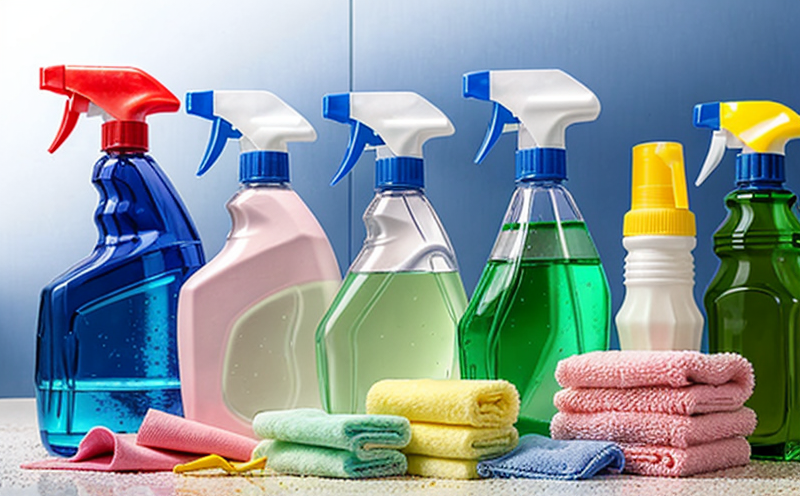Hard Water Performance Testing of Detergents
The testing and evaluation of detergents in hard water conditions are crucial to ensure that cleaning products perform effectively under various water quality parameters. Hard water, characterized by high mineral content (calcium and magnesium ions), can significantly affect the efficacy of detergents. In this section, we explore the challenges faced when using detergents in hard water environments and how our laboratory addresses these issues through comprehensive testing methods.
Hard water's minerals react with many detergents to form insoluble precipitates such as calcium soaps, which reduce detergent effectiveness. This reaction can lead to a reduction in cleaning power, increased use of product, and even the formation of soap scum or limescale, which are aesthetically undesirable and can be harmful if ingested.
Our testing protocols are designed to simulate real-world conditions found in hard water areas. By replicating these environments in our laboratory, we ensure that detergents perform effectively even under challenging conditions. The tests involve a series of controlled experiments where the detergent is used in hard water with varying mineral content levels.
The primary goal of this testing is to assess how well the detergent maintains its cleaning efficiency and effectiveness when confronted with hard water. This includes evaluating the detergent's ability to dissolve, foam properly, and remove stains as effectively as it would under soft water conditions. The results provide valuable insights for developers and manufacturers to improve product performance.
Our testing also helps in understanding how different types of detergents perform across various hardness levels. This information is crucial for formulators who need to tailor their products to suit a wide range of consumer needs, especially those living in areas with hard water. By offering this service, we contribute to the development of more versatile and effective cleaning solutions.
Our testing methodologies are based on international standards such as ISO 13468-2 and ASTM D7035, which provide a framework for evaluating detergent performance in hard water conditions. These standards ensure that our tests are consistent and comparable with those conducted by other laboratories around the world.
| Standard | Description |
|---|---|
| ISO 13468-2:2020 | Detergents and cleaning agents — Part 2: Determination of cleaning efficiency in hard water |
| ASTM D7035-19 | Detergent performance evaluation in hard water |
Applied Standards
The testing of detergents for their performance in hard water conditions is governed by several internationally recognized standards. These include ISO 13468-2:2020, which provides a standardized method for determining the cleaning efficiency of detergents in hard water, and ASTM D7035-19, which outlines procedures for evaluating detergent performance in challenging water conditions.
| Standard | Description |
|---|---|
| ISO 13468-2:2020 | Detergents and cleaning agents — Part 2: Determination of cleaning efficiency in hard water |
| ASTM D7035-19 | Detergent performance evaluation in hard water |
Scope and Methodology
The scope of our Hard Water Performance Testing of Detergents service is to ensure that cleaning products maintain their effectiveness in hard water conditions, which are prevalent in many regions worldwide. This testing encompasses a comprehensive series of evaluations designed to simulate real-world scenarios.
Our methodology involves several key steps: sample preparation, solution preparation, application of the detergent under controlled conditions, and finally, assessment of performance metrics. The samples used for these tests include various detergents such as laundry detergents, dishwashing liquids, and all-purpose cleaners. Each sample is tested across a range of hard water conditions to ensure broad applicability.
The solutions prepared are based on the mineral content levels found in typical hard water areas. This includes varying concentrations of calcium and magnesium ions that mimic real-world water hardness. The detergents are then applied under these controlled conditions, and their performance is assessed using a series of metrics including cleaning efficiency, foam production, and residue formation.
The results of these tests provide detailed insights into the detergent's ability to clean effectively in hard water conditions. These insights are invaluable for manufacturers looking to optimize their products for market needs. The data generated can help improve product formulations, enhance marketing strategies, and ensure regulatory compliance.
Quality and Reliability Assurance
- Our laboratory adheres strictly to ISO/IEC 17025 accreditation requirements for all testing procedures.
- We use state-of-the-art equipment calibrated regularly to ensure accurate measurements.
- The personnel involved in the testing are trained professionals with extensive experience in detergent and cleaning product evaluation.
- Our protocols are reviewed periodically to ensure they remain up-to-date and relevant to current industry standards.





